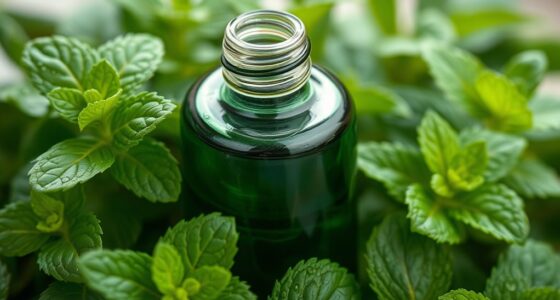Essential oils can be a natural support for your bone health, especially if you're managing osteoporosis. Oils like rosemary and cinnamon are known for their ability to enhance bone density and promote calcium absorption. You can use them through topical applications or aromatherapy for maximum benefit. Lavender oil helps alleviate pain and inflammation, making your routine more comfortable. Just remember to dilute essential oils with a carrier oil to avoid irritation. Incorporating these oils, along with nutritional support and exercise, creates a holistic approach to maintaining your bone health. Discover more about effective strategies and oils to evaluate!
Key Takeaways
- Essential oils like rosemary and ginger possess anti-inflammatory properties that support overall bone health and reduce osteoporosis risks.
- Cinnamon oil enhances osteocalcin synthesis, boosting calcium absorption and mineral deposition, vital for bone density.
- Topical applications, aromatherapy, and bath soaks of essential oils offer holistic benefits alongside traditional osteoporosis treatments.
- Lavender oil alleviates pain and inflammation, while thyme improves bone mass and density, contributing to improved overall bone health.
- Using essential oils should be combined with nutritional support, exercise, and stress management for a comprehensive approach to osteoporosis prevention.
Understanding Osteoporosis

Understanding osteoporosis is essential, especially since it affects millions of adults over 50. This bone disease leads to excessive bone loss or insufficient formation, making bones weak and fragile.
You might be surprised to learn that around 54 million adults in the U.S. face this condition, with one in two women and one in four men likely to experience a fracture. The disease is characterized by abnormal bone structure, which increases the risk of fractures in vital areas like the hip, spine, or wrist.
Major risk factors for osteoporosis include aging, hormonal changes, nutritional deficiencies, inactivity, and long-term medication use. Recognizing these factors can help you take proactive steps to maintain your bone health and reduce your risk.
Essential Oils for Bone Health

While many people focus on traditional treatments for osteoporosis, essential oils can play a significant role in enhancing bone health. Oils like rosemary, lavender, thyme, and ginger have anti-inflammatory and analgesic properties that help relieve pain and improve circulation, which is vital for those with osteoporosis.
Additionally, components like cinnamaldehyde and (R)-(+)-limonene stimulate cell proliferation and enhance osteocalcin synthesis, promoting bone formation. Research even suggests that cinnamaldehyde can triple mineral deposition in stem cells, improving bone mineralization.
You can use essential oils through topical applications, aromatherapy, or bath soaks, providing holistic benefits. Incorporating these oils alongside traditional treatments can offer a safer alternative with fewer side effects, making them a valuable part of your bone health strategy. Furthermore, aromatic cleaning with essential oils can improve indoor air quality, creating a healthier environment that supports overall wellness.
Benefits of Essential Oils

Essential oils offer a range of benefits that can enhance your overall health and well-being, especially for those managing osteoporosis.
Essential oils like rosemary and thyme can improve bone mass and density, providing a natural approach to supporting bone health.
Lavender oil's analgesic and anti-inflammatory properties help relieve pain and reduce inflammation linked to osteoporosis.
Additionally, cinnamaldehyde from cinnamon boosts cell proliferation and mineral deposition in bone cells, which is essential for calcium absorption.
By enhancing circulation to your bones, essential oils play a significant role in maintaining bone strength and preventing deterioration.
Using these oils can offer holistic benefits, acting as complementary therapies alongside traditional treatments, often with fewer side effects.
Key Essential Oils

When considering essential oils for osteoporosis, you'll find several key options that offer anti-inflammatory and pain relief benefits.
Oils like rosemary and lavender can help ease discomfort while promoting better bone health.
Let's explore how to apply these oils effectively for maximum benefit.
Anti-inflammatory Properties
Inflammation can be a significant factor in the discomfort associated with osteoporosis, but certain essential oils offer natural relief.
These anti-inflammatory oils can promote bone health and ease your discomfort:
- Rosemary – Known for its potent anti-inflammatory properties, it helps alleviate pain.
- Ginger – This oil reduces joint discomfort, supporting overall bone health.
- Cinnamon – Cinnamaldehyde in cinnamon oil stimulates cell proliferation, enhancing bone formation.
- Thyme – With its antimicrobial and antioxidant benefits, thyme aids in reducing inflammation.
Incorporating these essential oils into your routine can enhance circulation and support the healing process of bones, making them valuable natural remedies for managing osteoporosis. Additionally, conducting patch tests before applying essential oils topically is essential to avoid skin irritation.
Embrace these oils as part of your holistic approach to better bone health!
Pain Relief Benefits
Managing discomfort is key for those living with osteoporosis, and certain oils can provide significant pain relief.
Rosemary essential oil can enhance blood flow to affected areas, improving bone mass and density while alleviating pain.
Lavender essential oil offers analgesic and anti-inflammatory properties, making it ideal for managing pain and inflammation related to osteoporosis.
Thyme essential oil helps relieve muscle tension with its antispasmodic effect, supporting healing.
Peppermint essential oil, rich in menthol, relaxes muscles and reduces inflammation, easing discomfort tied to bone pain.
Finally, clove essential oil acts as a powerful analgesic, particularly for fracture-related pain, enhancing your overall comfort.
Incorporating these essential oils into your routine can be a natural way to support pain relief for osteoporosis.
Application Methods
Essential oils offer versatile application methods that can enhance your experience with osteoporosis management. Here are some effective ways to use them:
- Topical Application: Dilute essential oils with a carrier oil (2-5 drops per tablespoon) and apply directly to painful areas for targeted relief.
- Aromatherapy: Diffuse oils like lavender or eucalyptus to promote relaxation and help manage pain through your olfactory system.
- Bath Soaks: Add lavender or rosemary to your bath for both topical relief and soothing aromatherapy benefits.
- Compresses: Soak a cloth in a diluted mixture of anti-inflammatory oils, such as ginger or peppermint, and apply to sore spots for effective relief.
Incorporating these methods can support your overall bone health journey.
How to Use Essential Oils

When you're looking to incorporate essential oils into your routine for osteoporosis relief, there are several effective methods to contemplate.
You can apply essential oils topically by diluting 2-5 drops with a carrier oil like jojoba or coconut oil. This helps prevent skin irritation while delivering localized relief.
Aromatherapy is another option; diffusing oils such as lavender or eucalyptus promotes relaxation, which can support bone health.
Bath soaks with these oils and Epsom salt provide both topical and aromatic benefits.
Additionally, you can make compresses by soaking a cloth in diluted oils for targeted relief.
Finally, consider DIY recipes for blends to help manage osteoporosis symptoms, like a soothing chamomile massage oil for nighttime relaxation.
Dietary and Nutritional Support

A well-balanced diet plays an essential role in supporting bone health and preventing osteoporosis. To strengthen your bones, focus on incorporating these key nutrients:
- Calcium: Aim for 1,000 mg daily from sources like dairy products, leafy greens, and fortified foods.
- Vitamin D: Get several minutes of sunlight exposure weekly, and include fatty fish and fortified foods to enhance calcium absorption.
- Magnesium: Consume around 500 mg daily from nuts, seeds, whole grains, and legumes for added support.
- Omega-3 Fatty Acids: Eat wild-caught fish and flaxseeds to improve bone density and reduce inflammation. Additionally, starting your day with a protein-rich breakfast like an Egg Rollup and Dumpling Sauce can support overall nutrient intake.
Additionally, limit foods high in added sugars, caffeine, and excessive alcohol to help maintain ideal bone health.
Lifestyle Modifications

To support your bone health, consider making some key lifestyle modifications.
Regular weight-bearing exercises, balanced nutrition, and effective stress management can all play an essential role in enhancing bone density and overall well-being.
Exercise for Bone Density
Engaging in regular exercise is essential for enhancing bone density and reducing the risk of osteoporosis.
By incorporating specific activities into your routine, you can notably strengthen your bones. Consider these effective exercises:
- Brisk walking or jogging – Stimulates bone formation and improves overall fitness.
- Resistance training – Aim for at least three sessions a week to build muscle strength and support bone density through mechanical loading.
- Yoga – Enhances flexibility and balance, positively impacting your overall well-being.
- Tai Chi – Improves coordination, which is vital for fall prevention.
Nutrition and Dietary Choices
Maintaining bone health doesn't just rely on exercise; nutrition plays an essential role too. To effectively support your bones, focus on important nutrients like calcium and vitamin D. Aim for about 1,000 mg of calcium daily, which you can get from dairy products, leafy greens, and fortified foods.
Don't forget vitamin D, which you can absorb from sunlight and fatty fish, as it helps your body utilize calcium effectively.
Additionally, limit excessive alcohol, sweetened beverages, and processed foods that can increase inflammation and risk of osteoporosis. Incorporating nutrient-dense foods like legumes, nuts, and omega-3 unsaturated fats will further support your skeletal health and play an important part in preventing bone loss.
Including whole foods in your diet can enhance nutrient intake and contribute to overall bone health.
Choose wisely for stronger bones!
Stress Management Techniques
While stress might seem like a normal part of life, managing it effectively is crucial for maintaining bone health. Chronic stress can elevate cortisol levels, negatively impacting bone density.
Here are some stress management techniques you can incorporate into your routine:
- Practice mindfulness or meditation to lower cortisol levels and promote relaxation.
- Engage in regular physical activity like yoga or tai chi, which supports bone health while relieving stress.
- Incorporate deep breathing exercises to enhance oxygen delivery and improve nutrient absorption essential for bone health.
- Prioritize a balanced lifestyle with adequate sleep and social connections to combat stress and support overall well-being. Additionally, using essential oils can stimulate the limbic system and further promote relaxation, enhancing your stress management efforts.
Safety and Precautions

When using essential oils for osteoporosis, it's crucial to prioritize safety and take necessary precautions.
Always dilute essential oils with a carrier oil, using a ratio of 2-5 drops per tablespoon to prevent skin irritation. Conduct a patch test before applying widely to check for allergic reactions.
Remember, individual sensitivity varies, so start with small amounts to gauge your tolerance. If you're pregnant or have existing health issues, consult your healthcare provider to guarantee safe use of essential oils.
Additionally, store your oils in cool, dark places and regularly check expiration dates to maintain their potency and safety.
Taking these steps will help you enjoy the benefits of essential oils without unnecessary risks.
Holistic Approach to Osteoporosis

A holistic approach focuses on enhancing your bone health through a combination of natural remedies and lifestyle changes. Here are some key strategies you can incorporate:
- Essential oils like rosemary, lavender, and thyme to promote bone regeneration.
- Nutritional interventions ensuring you get enough calcium, vitamin D, and magnesium.
- Weight-bearing exercises and resistance training to boost bone density.
- Stress management techniques such as mindfulness and aromatherapy to support hormonal balance.
Additionally, incorporating music therapy can enhance emotional well-being and support your overall health during your journey with osteoporosis.
Frequently Asked Questions
What Is the Best Essential Oil for Osteoporosis?
When considering the best essential oil for osteoporosis, you might want to explore a few options.
Rosemary essential oil stands out for its potential to improve bone density and relieve pain.
Thyme offers antioxidant benefits, while lavender can help with inflammation and pain relief.
Ginger's anti-inflammatory properties can also support joint health.
Ultimately, trying different oils may help you find what works best for your specific needs and preferences.
What Is the Best Oil for Bone Density?
You might think that any oil could help with bone density, but some actually stand out.
Rosemary essential oil's been linked to improved bone mass, while clary sage can support hormonal balance, especially for women.
Ginger essential oil's anti-inflammatory properties can also aid in reducing discomfort, making it easier for you to stay active.
Explore these options, and see how they might enhance your bone health journey!
What Essential Oil Heals Bones?
When you're looking to heal bones, essential oils like thyme, rosemary, and clary sage might be your best bet.
Thyme, in particular, has shown promise in improving bone density and inhibiting bone loss. Rosemary and clary sage also support overall bone health.
You can use these oils through topical applications or diffusion to enhance their benefits.
Just remember to combine them with other treatments for maximum effectiveness in your bone healing journey.
How to Reverse Osteoporosis and Increase Your Bone Density?
To reverse osteoporosis and boost your bone density, start incorporating regular weight-bearing exercises like brisk walking or strength training into your routine.
Focus on a diet rich in calcium, vitamin D3, and magnesium to support bone health.
Consider herbal supplements that may inhibit bone loss, and make lifestyle changes like quitting smoking and reducing alcohol intake.
These combined efforts can greatly enhance your bone density and overall skeletal health.
Stay proactive!
Conclusion
In your journey to better bone health, think of essential oils as the gentle, guiding light through a dense forest. By integrating these natural remedies, along with a balanced diet and lifestyle changes, you can forge a stronger foundation against osteoporosis. Embrace this holistic approach, and let the soothing scents and powerful properties of essential oils nurture your bones, helping you stand tall and resilient like an ancient oak, rooted firmly in the earth.










